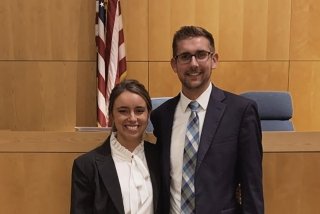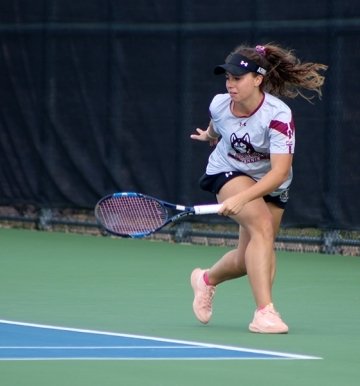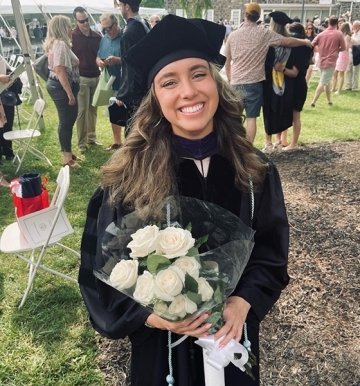Alumni pair leverage homegrown grit to tackle law school
University-wide
Posted

Competing with an underdog, small school mindset is nothing new for Nick McGuire and Siena Cerra, who each successfully did so as NCAA Division II student-athletes at Bloomsburg University.
That competitive fire and relentless determination — forged in Bloomsburg — helped fuel them through three years of law school and served as a driving force this spring in Widener University Delaware Law School's Distinguished Jurist Moot Court Competition.
"Every time I stand up to present my argument, I bring Bloomsburg up there with me," says Cerra '19, who graduated from BU with a degree in history and was a scholar-athlete tennis player. "When you're in a profession where most members attended private schools, there's a sort of stigma or feeling of inferiority when you're one of the only ones who attended a public state college."
She adds, "This stigma only further drives me to prove everyone wrong. Bloomsburg gave me all the same tools, if not more, any private or top school could have given me. Most importantly, Bloomsburg gave me the confidence and drive to pursue my goals, even when they seemed out of reach."
The two Huskies are set to tackle the bar exam this month after graduating with their Juris Doctor degrees from the Widener University Delaware Law School in May.

"I'm a very competitive person, so I always want to give
100% to anything I do," says McGuire '19, who graduated BU with a degree in political science and was a scholar-athlete distance runner. "I'm also a person who likes to prove people wrong. I think there's a misconception about state schools that we're somehow ‘less than' other schools. It's honestly the same thing I faced in cross-country when I made it to nationals."
He adds, "People don't expect state school grads will do great things (at least in the legal field), and so I'm always proud to say I graduated from Bloomsburg when people ask what school I went to."
The two former student-athletes found themselves in a competitive environment once again in the months leading up to graduating law school. Teamed together — informally representing Bloomsburg — their small school mindset was on full display during the moot court competition, open to Delaware Law students with the requisite GPA and present Moot Court Honor Society members.
"Being in the distinguished jurist competition honestly made me feel like I was back out on the course running in a race," McGuire says. "The drive to place well and keep moving on round after round felt so much like how I would pick other runners off in races to get to the front of the pack. Being a student-athlete, you have to give 110% to everything you compete in, and that translates to law school as well. No matter how small the assignment, I'll give it my full effort."
Moot court is an honor society for students, McGuire said, and is based on appellate advocacy. Students present mock arguments before a mock Supreme Court as part of the competition. Competitors are required to write and submit an appellate brief for their assigned position (petitioner or respondent), and oral arguments began a week later. There are four rounds of oral arguments, which are set up like a tennis tournament, according to Cerra — prelims, quarterfinals, semifinals, and finals.

"Teams face off head-to-head in front of a panel of
judges," Cerra says. "These judges consist of local alumni, attorneys, and judges. The arguments are conducted like real Supreme Court oral arguments. The petitioner is allotted 15 minutes, and the respondent is allotted the same to conduct their argument and answer legal questions from the judges. Whichever team is most effective each round ‘knocks out' their opposing counsel and advances to the next round."
The competition continues until there are two teams left standing out of the original 20, according to Cerra. And that's where the two Huskies ended up — in the finals, where they placed second overall.
"Being a law student comes with a lot of pressure to perform well to move past the obstacles of exams, and the bar to ultimately become an attorney," Cerra says. "Moot Court competitions are full of pressure — defending your argument to a panel of legal experts is terrifying. Being a student-athlete at BU taught me how to deal with pressure and overcome difficult situations by staying tough and focused on an end goal."
The classroom also served McGuire well in his preparation for law school.
"Bloomsburg's political science program gave me the

critical thinking skills that are needed in law school," McGuire says. "I also took two semesters of constitutional law and a class called judicial process with Dr. Neil Strine, which gave me a preview of what was to come in law school. Law school is just a totally different beast from college and in some respects, no matter what school you go to for undergrad, nothing will prepare you for certain aspects of the way the courses are taught."
Cerra too felt her Bloomsburg education positioned her to succeed in law school, particularly her liberal arts foundation that featured a history major and three minors. "History seminars are conducted very similarly to a law school class," Cerra says. "Everyone is expected to prepare the readings to the extent they're able to share and defend their thoughts. The better prepared you are each day for class, the more successful you'll be not only on the final but as a practicing attorney."
She adds, "History seminars were typically only 10 to 20 students, so everyone had to be prepared or it really showed if you weren't able to contribute to the class discussion," Cerra says. "Law school classes you are actually able to ‘hide' a bit more because class lectures usually have over 50 students."
Beyond her core major classes, Cerra says her minor pathway through legal studies, Middle Eastern studies, and sociology each helped her with different elements of learning the law.
"The classes I took with the legal studies minor gave me important background understanding," Cerra says. "The classes I took for Middle Eastern studies provided me with a more well-rounded worldview and a fantastic understanding of how the law works in society. Professor Safa always asked us, ‘What are the rules of the game?' This stuck with me throughout law school."
According to Cerra, studying sociology gave her a wonderful theoretical perspective along with, of course, a better understanding of society and the way the rules and laws impact different groups.
"Minoring in three areas also provided me with three more advisors ... win, win," Cerra says. "All of my advisors went above and beyond for me while I was applying to law schools. From counseling to letters of recommendation to sitting down and helping me with my personal statement."
Pending passing their respective bar exams, McGuire, who graduated Cum Laude from Delaware Law, plans to work as an assistant district attorney at the Delaware County District Attorney's Office in Media and Cerra will be clerking for the Honorable William C. Carpenter of the Superior Court of Delaware and then working at the law firm White & Williams as an associate attorney.



